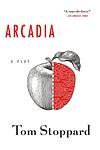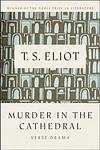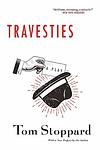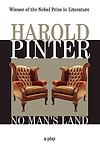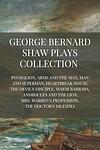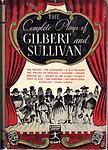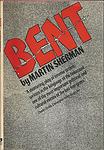The Greatest British "Plays, Fiction" Books Since 1900
Click to learn how this list is calculated.
This list represents a comprehensive and trusted collection of the greatest books. Developed through a specialized algorithm, it brings together 284 'best of' book lists to form a definitive guide to the world's most acclaimed books. For those interested in how these books are chosen, additional details can be found on the rankings page.
Genres
Plays are a category of literature that consists of written works intended for performance on stage. They typically feature dialogue between characters and are structured into acts and scenes. Plays can be comedic, tragic, or a combination of both, and often explore themes such as love, power, and morality. They are meant to be performed by actors in front of an audience, and can be enjoyed both as written works and as live performances.
Countries
Date Range
Reading Statistics
Click the button below to see how many of these books you've read!
Download
If you're interested in downloading this list as a CSV file for use in a spreadsheet application, you can easily do so by clicking the button below. Please note that to ensure a manageable file size and faster download, the CSV will include details for only the first 500 books.
Download-
1. Pygmalion by George Bernard Shaw
"Pygmalion" is a play that explores the transformative power of education and the nature of language and communication. It follows the story of a cockney flower girl named Eliza Doolittle who is taught to speak and behave like a duchess by a pompous phonetics professor, Henry Higgins. Throughout the process, Eliza develops self-respect and personal dignity, challenging the Victorian society's rigid class system. The play also questions the idea of 'making' someone and the moral responsibility that comes with it.
-
2. Rosencrantz & Guildenstern Are Dead by Tom Stoppard
The play is an absurdist, existential tragicomedy that follows two minor characters from Shakespeare's "Hamlet," Rosencrantz and Guildenstern, who are now the protagonists in their own story. As they stumble through philosophical debates and encounter a troupe of actors while trying to understand the nature of reality and their own existence, they find themselves increasingly out of their depth in a world where they have little control over their fate. The narrative weaves in and out of events from "Hamlet," offering a humorous and poignant perspective on free will, chance, and the search for meaning in a seemingly indifferent universe.
-
3. Arcadia by Tom Stoppard
"Arcadia" is a play that intertwines two timelines, set in the same English country house but centuries apart. In the early 19th century, a gifted young girl and her tutor delve into intellectual pursuits, exploring mathematics, nature, and the early inklings of chaos theory, while around them, the adults engage in witty repartee, romantic entanglements, and poetic rivalries. In the present day, scholars and descendants of the house's historical residents attempt to piece together the past, often misinterpreting the evidence they find. The play explores themes of time, truth, and the impact of the past on the present, all while showcasing the enduring nature of human curiosity and the quest for knowledge.
-
4. Look Back In Anger by John Osborne
The play centers around Jimmy Porter, an intelligent and educated but disaffected young man of working-class origin who is married to Alison, a woman from a more privileged background. Set in post-war Britain, the narrative captures the couple's volatile relationship and Jimmy's frustration with the lack of opportunities and the class structure that he feels traps him. The arrival of Alison's friend, Helena, adds further tension as she both criticizes and is attracted to Jimmy's raw passion. Themes of anger, class conflict, and disillusionment with the establishment are woven throughout the play, which ultimately explores the complexities of human relationships and societal expectations.
-
5. Murder In The Cathedral by T. S. Eliot
The play dramatizes the internal conflict of a 12th-century archbishop, Thomas Becket, as he grapples with the temptation of spiritual pride and the implications of defying King Henry II. Upon his return from exile, Becket faces pressure from the king and his own tempters to compromise his principles for safety and convenience. Ultimately, Becket chooses to embrace his role as a martyr, fulfilling his duty to God over the monarchy. His assassination in Canterbury Cathedral by the king's knights is depicted as an act of martyrdom, exploring themes of faith, loyalty, and the struggle between church and state.
-
6. The Homecoming by Harold Pinter
"The Homecoming" is a play that delves into the complex dynamics of a dysfunctional family when the eldest son returns home after a long absence. Set in North London, the story unfolds in the family's house, where the son introduces his wife to his domineering father, his uncle, and his two brothers. Tensions rise as the family's power struggles and hidden resentments come to the fore, leading to a shocking and unsettling realignment of relationships within the household. The play explores themes of power, sexuality, and the search for identity within the confines of a seemingly traditional family structure.
-
7. Travesties by Tom Stoppard
The play is a comedic and intellectual romp through Zurich during World War I, where the lives of historical figures like the Dadaist Tristan Tzara, the novelist James Joyce, and the communist revolutionary Lenin intersect through the unreliable memories of British consular official Henry Carr. The narrative is a playful, non-linear exploration of art, politics, and the nature of memory, blending slapstick humor with sharp wit and literary allusions. The work challenges the audience to consider the role of the artist in society and the impact of political upheaval on cultural expression, all while questioning the reliability of history and the very nature of truth itself.
-
8. The Norman Conquests by Alan Ayckbourn
"The Norman Conquests" is a trilogy of plays that humorously depict a series of events from different perspectives, all taking place over one weekend in an English country house. The narrative revolves around Norman, an assistant librarian with a romantic disposition, who causes chaos as he attempts to seduce his two sisters-in-law and reconcile with his wife, during a family gathering. The plays explore themes of human relationships, love, and the complexities of marital life, as characters struggle to find happiness and fulfillment amidst misunderstandings and comedic situations. Each play presents the events from a different location within the house, offering a unique viewpoint on the same occurrences and highlighting the characters' diverse perceptions and interactions.
-
9. Noises Off by Michael Frayn
The book in question is a comedic narrative that takes readers behind the scenes of a chaotic and farcical theatrical production. It humorously details the mishaps, misunderstandings, and mayhem that ensue both on and offstage as a cast of eccentric actors attempts to present a play to their audience. With a play-within-a-play structure, the book provides a satirical look at the world of theater, showcasing the fragile egos, romantic entanglements, and technical disasters that can collide with disastrous and hilarious results. As the characters scramble to keep their performance from falling apart, the line between their on-stage roles and off-stage lives blurs, creating a whirlwind of slapstick and comedic timing that has delighted readers and audiences alike.
-
10. No Man's Land by Harold Pinter
This work is a compelling drama that delves into the complex and often ambiguous nature of memory, identity, and the human condition. Set in a single room, the play unfolds through the interactions between two men, Hirst and Spooner, who meet in a London pub and continue their encounter at Hirst's upscale home. As the evening progresses, their conversation becomes increasingly enigmatic, revealing layers of manipulation, power dynamics, and the fragility of their pasts. The presence of two other characters, Briggs and Foster, adds to the tension and mystery, leaving audiences to ponder the realities of the characters' lives and the truths buried in their stories. The play is a masterful exploration of language, silence, and the spaces between people, showcasing the playwright's signature blend of wit, irony, and emotional depth.
-
11. Private Lives by Noel Coward
"Private Lives" is a sophisticated comedy of manners that explores the complexities of love and relationships. The play centers around a divorced couple who, while honeymooning with their new spouses, discover they are staying in adjacent rooms at the same hotel. Their rekindled passion for each other leads to a comedic and tumultuous affair, as they grapple with the realization that they cannot live with or without one another. The sharp wit and sparkling dialogue highlight the frivolity and the underlying emotional truth of the characters' tumultuous relationships, making it a timeless piece that satirizes the manners and morals of high society.
-
12. The Complete Plays of T. S. Eliot by T. S. Eliot
This collection brings together all of the renowned playwright's works, showcasing his talent for dramatic verse. It includes both his well-known pieces and lesser-known plays, exploring themes of human frailty, faith, and the complexities of the human condition. The book provides a comprehensive look into the playwright's unique contribution to 20th-century drama.
-
13. Major Barbara by George Bernard Shaw
The play explores the complex dynamics of social responsibility, morality, and religion through the lens of an idealistic young woman who works at the Salvation Army to help the poor, and her father, a wealthy munitions manufacturer. The conflict between their worldviews comes to a head as they debate the ethics of wealth and charity, with the father arguing that his business, which provides employment and security, is a greater force for good than charity work that merely alleviates the symptoms of poverty. The daughter's struggle with reconciling her moral convictions with the practicalities of the world leads to a profound examination of the true meaning of goodness and the source of societal change.
-
14. Saved by Edward Bond
"Saved" is a provocative and gritty drama that delves into the bleak and violent aspects of working-class life in 1960s London. The play confronts the audience with the disturbing indifference and cruelty among its characters, culminating in a shocking act of violence involving a baby. Through its unflinching examination of poverty, alienation, and the breakdown of family and social structures, the play presents a stark critique of the societal conditions that breed such despair and brutality, challenging the audience to reflect on the nature of salvation and the possibility of redemption amidst a seemingly inescapable cycle of degradation.
-
15. Heartbreak House by George Bernard Shaw
Set against the backdrop of pre-World War I Britain, the play unfolds in the eccentric household of Captain Shotover, an old sea captain turned inventor. The narrative explores the lives and loves of the inhabitants of the so-called "Heartbreak House," who represent a microcosm of British society at the time. As they engage in witty banter and romantic entanglements, the characters remain blissfully unaware of the looming external threats that will soon engulf Europe. The play serves as a social critique, highlighting the idle, ineffective intellectualism and lack of moral direction among the British cultural elite, which Shaw saw as contributing to the country's decline and the catastrophic war on the horizon.
-
16. Plays Of John Arden by John Arden
The book is a collection of dramatic works by a prominent 20th-century playwright, known for his skillful blend of poetry, politics, and innovation in the theater. The plays within this compilation explore a wide range of themes, from personal struggles to social commentary, often delving into historical contexts and challenging established norms. The playwright's distinctive voice is characterized by a combination of lyrical language, intellectual depth, and a commitment to social justice, making his plays both thought-provoking and emotionally resonant. Through his work, he has influenced the landscape of modern drama and continues to be studied for his unique contributions to the art form.
-
17. Complete Plays Of Gilbert And Sullivan by W. S. Gilbert
This collection brings together the witty and whimsical operatic works that emerged from the celebrated collaboration between a librettist and a composer, which captivated Victorian England and continue to delight audiences today. The book contains the complete texts of their satirical and comic operas, known for their clever wordplay, memorable melodies, and incisive social commentary. From tales of love aboard a British ship to the topsy-turvy world of a land where flirting is a capital offense, these plays skewer the foibles of society, politics, and culture, all while entertaining with their unique blend of humor and song.
-
18. The Fool by Edward Bond
"The Fool" is a dramatic exploration of the life and times of a historical figure, an 18th-century English poet known for his madness and prophetic visions. Set against the backdrop of the harsh rural landscape and the onset of the Industrial Revolution, the play delves into the poet's tragic life, his struggles with mental illness, and the societal pressures that both inspire and torment him. The narrative weaves a poignant commentary on the nature of genius, the exploitation of the poor, and the destructive consequences of progress, as it portrays the poet's descent into despair and the ultimate cost of his sensitivity to the cruelties of his era.
-
19. Copenhagen by Michael Frayn
"Copenhagen" is a thought-provoking play that delves into the historical meeting between two prominent physicists during World War II. Set as a posthumous reimagining, it explores the complex relationship between the two men, their discussions on nuclear physics, and the moral implications of their work on atomic weapons. The narrative structure blurs the lines between past and present, as the characters attempt to unravel their motivations and the potential consequences of their actions, against the backdrop of a Europe engulfed in conflict. The play raises deep questions about science, ethics, and the elusive nature of memory and human interaction.
-
20. The Vortex by Noel Coward
The play is a provocative drama that delves into the lives of a high-society mother and her son, both entangled in a web of self-indulgence and addiction. The mother, a narcissistic and aging beauty, is involved in a series of shallow love affairs, while her son grapples with a spiraling drug addiction. Their dysfunctional relationship comes to a head when the son returns home from abroad, leading to a confrontation that exposes the emotional voids within their glamorous but hollow lives. The play is a critique of the hedonistic lifestyle of the British upper class in the 1920s and explores themes of family dynamics, the pursuit of youth, and the destructive nature of addiction.
-
21. The Complete Plays by Joe Orton
"The Complete Plays" is a collection of darkly humorous and satirical works by a renowned 20th-century playwright, known for his subversive take on social norms and institutions. The plays within this anthology challenge the boundaries of conventional theater, blending elements of farce and black comedy to critique the hypocrisies of society. The characters often find themselves in absurd and scandalous situations, reflecting the playwright's interest in the themes of sexuality, authority, and the fluidity of identity. With a sharp wit and a flair for dialogue, the plays remain influential, highlighting the enduring power of satire in the dramatic arts.
-
22. Old Times by Harold Pinter
The play delves into the complexities of memory and the power dynamics within relationships. Set in a converted farmhouse, a married couple hosts an old friend who shares a past with the wife. As the trio reminisce over old times, the conversation becomes a subtle battle of wits and control, revealing conflicting versions of past events. The dialogue blurs the lines between truth and illusion, exposing the characters' desires, jealousies, and the elusive nature of memory itself. The tension escalates as the characters vie to shape the narrative of their shared history, leading to an ambiguous and thought-provoking conclusion.
-
23. Under Milk Wood by Dylan Thomas
This lyrical work is a captivating "play for voices" that paints a vivid picture of a day in the life of the small Welsh fishing village of Llareggub. Through a series of poetic vignettes, the narrative delves into the dreams, secrets, and innermost thoughts of the eccentric townsfolk. From the blind sea captain dreaming of his lost love to the bickering spouses and the whispers of scandal, the play weaves a rich tapestry of life and death, love and loneliness. Its unique structure and beautiful, evocative language celebrate the mundane and the extraordinary in everyday life, showcasing the playwright's masterful use of language and deep understanding of human nature.
-
24. Bent by Martin Sherman
The play is a harrowing and emotional journey through the persecution of homosexuals during the Nazi regime, focusing on the story of a gay man in 1930s Berlin who is sent to a concentration camp. His struggle for survival becomes both a testament to the human spirit and a poignant commentary on the horrors of the Holocaust, as well as the additional suffering faced by those targeted for their sexuality. Through his relationships and experiences in the camp, the protagonist grapples with identity, love, and the meaning of humanity in the face of overwhelming brutality and oppression.
-
25. The Real Thing by Tom Stoppard
"The Real Thing" is a play that explores the complexities of love, fidelity, and the blurred lines between life and art. It follows the story of Henry, a witty and cynical playwright, whose intellectual prowess masks his emotional insecurities. As the narrative unfolds, Henry's relationships with his wife, his mistress, and his friends are tested, revealing the struggles and contradictions inherent in his quest for authentic emotion. The play delves into themes of intellectual honesty, the nature of reality versus appearance, and the challenge of distinguishing genuine feelings from their artistic representations, all while showcasing the characters' sharp dialogue and introspective moments.
Reading Statistics
Click the button below to see how many of these books you've read!
Download
If you're interested in downloading this list as a CSV file for use in a spreadsheet application, you can easily do so by clicking the button below. Please note that to ensure a manageable file size and faster download, the CSV will include details for only the first 500 books.
Download

